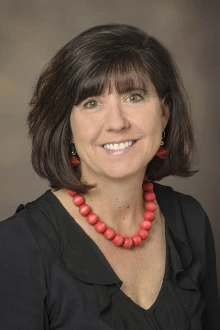Dr. Monica Kraft Awarded Rotary International’s Paul Harris Fellowship
Monica Kraft, MD, professor and chair of the College of Medicine – Tucson’s Department of Medicine and deputy director of the Asthma and Airway Disease Research Center, has received the Paul Harris Fellowship Award from Rotary International for her contributions to precision medicine as both principal investigator for the University of Arizona – Banner Health All of Us Research Program and a renowned basic and translational physician-scientist specializing in precision medicine therapies to treat severe asthma.

Monica Kraft, MD
“In becoming a Paul Harris fellow, you’re joining a remarkable community of people throughout the world who are recognized for their commitments to service above self,” said Rotary Club of Tucson Sunrise’s Rotary Foundation Director Richard Hallick, PhD, retired UArizona professor of biochemistry, during the award ceremony. “Tucson Sunrise is proud to award you an honorary fellowship in recognition of your extraordinary service to the Tucson community in the field of medical research and public health.”
“I am very honored to be recognized by a group that is so important to the Tucson community and beyond,” said Dr. Kraft, who is the Robert and Irene Flinn Endowed Chair in Medicine and a BIO5 Institute member. “I so appreciate the recognition of my contributions over the course of my career.”
Dr. Kraft joined the College of Medicine – Tucson in 2014. Her research has been consistently funded by the NIH and the American Lung Association for 25 years, and she serves on the National Heart, Lung, and Blood Institute Advisory Council. In 2019, she was named the Arizona Bioscience Researcher of the Year, and in 2020, she was appointed to serve as contact principal investigator for the University of Arizona – Banner Health All of Us Research Program.
“All of Us is a historic longitudinal effort to gather data from at least 1 million people living in the U.S. to accelerate research and improve health. Ultimately, we want to deliver the richest, most effective health care to our patients,” Dr. Kraft said. “In Arizona, we began enrollment in 2017. We’ve recruited over 40,000 participants between Tucson and Phoenix, and more than 82% are underrepresented in biomedical research. To understand what drives health and disease, you’ve got to study a diverse group of people. I’m extremely proud of the team.”
Rotary International is a global network of 1.2 million members dedicated to taking action to create lasting change in response to the world’s most persistent issues. More than 35,000 clubs work together to promote peace; fight disease; provide clean water, sanitation and hygiene; save mothers and children; support education; and grow local economies.

